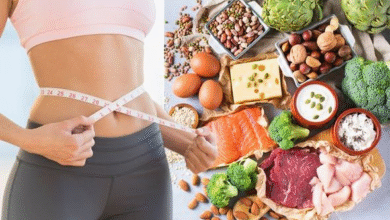Keto-Banned Foods , What to Avoid for Optimal Ketosis

Grains and Starches: The Primary Offenders
Complete Avoidance List
- All breads: White, whole wheat, sourdough, pita, naan
- Grains: Rice (white/brown), quinoa, oats, barley, couscous
- Pasta: All wheat-based varieties including “whole grain” options
- Breakfast cereals: Even “healthy” granolas and muesli
- Baked goods: Muffins, bagels, crackers, pretzels
Scientific Rationale: These foods contain 45-75g net carbs per 100g, causing immediate blood sugar spikes that disrupt ketosis.
Starchy Vegetables: Hidden Carb Dangers
Highest Carb Vegetables to Eliminate
| Vegetable | Net Carbs per 100g |
|---|---|
| Potatoes | 17g |
| Sweet potatoes | 20g |
| Corn | 19g |
| Beets | 9g |
| Parsnips | 13g |
| Peas | 14g |
Pro Tip: Even carrots (7g/100g) and onions (7g/100g) should be strictly limited.
Problematic Fruits: Nature’s Candy
Fruits to Exclude
- Tropical fruits: Bananas (23g), mangoes (15g), pineapples (13g)
- Dried fruits: Raisins (79g), dates (75g), figs (54g)
- High-sugar fruits: Grapes (18g), cherries (16g), pomegranates (14g)
Exception: Small portions (50g) of berries (raspberries 5g, blackberries 4g, strawberries 6g per 100g).
Sweetened Beverages: Liquid Carbs
Forbidden Drinks
- Sodas: Regular (39g/12oz) and diet (artificial sweeteners)
- Fruit juices: Orange juice (26g/250ml), apple juice (28g/250ml)
- Specialty coffees: Frappuccinos (50g), flavored lattes (35g)
- Alcohol: Beer (13g/12oz), sweet wines (20g/glass), cocktails
Ketone Killer: A single can of soda can contain 39g sugar – nearly a full day’s keto allowance.
Processed Foods: Hidden Carb Traps
Stealth Carb Sources
- Condiments: Ketchup (29g/100g), BBQ sauce (35g/100g)
- Dressings: Fat-free varieties often sugar-loaded
- Protein bars: Many contain 20g+ net carbs
- “Low-fat” products: Typically add sugar for flavor
Label Red Flags: Maltodextrin, dextrose, fructose, fruit juice concentrate.
Industrial Seed Oils: The Inflammation Connection
Oils to Eliminate
- Soybean oil
- Canola oil
- Corn oil
- Cottonseed oil
- Sunflower oil
- Safflower oil
Why: High omega-6 content (20:1 ratio to omega-3s) promotes systemic inflammation.
Legumes and Beans: Protein with Carb Strings
Prohibited Legumes
- Chickpeas (45g/100g dry)
- Lentils (40g)
- Black beans (44g)
- Kidney beans (47g)
- Peanuts (16g)
Alternative: Macadamia nuts (4g), pecans (4g), walnuts (7g) per 100g.
Dairy Products: Selective Approach
Dairy to Limit or Avoid
- Milk (12g/cup)
- Sweetened yogurts (20-30g/serving)
- Low-fat cheeses (often contain additives)
- Ice cream (28g/1/2 cup)
Keto-Friendly Options: Heavy cream (3g/cup), full-fat Greek yogurt (4g/100g), hard cheeses (<1g/oz).
Artificial Sweeteners: Metabolic Wild Cards
Problematic Sweeteners
- Maltitol (glycemic index 35)
- Aspartame (may trigger insulin response)
- Sucralose (alters gut microbiome)
- Agave nectar (85% fructose)
Safer Alternatives: Stevia, erythritol, monk fruit (in moderation).
Implementation Strategy
- Pantry Purge: Remove all non-keto items
- Meal Prep: Cook keto meals in advance
- Dining Out Guide: Stick to protein + non-starchy veggies
- Emergency Snacks: Keep macadamias/string cheese handy
Pro Tip: When in doubt, check macros using apps like Cronometer before eating.
Common Mistakes to Avoid
- Overeating “keto” treats: Even low-carb foods can stall weight loss
- Ignoring hidden carbs: Spices, medications, supplements
- Neglecting electrolytes: Sodium, potassium, magnesium
- Underestimating protein needs: 1.2-2.0g per kg lean mass
By strictly avoiding these food categories and focusing on quality fats, adequate protein, and low-carb vegetables, you’ll maintain optimal ketosis and accelerate your metabolic transformation.






